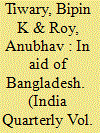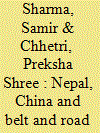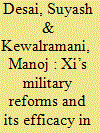|
|
|
Sort Order |
|
|
|
Items / Page
|
|
|
|
|
|
|
| Srl | Item |
| 1 |
ID:
187129


|
|
|
|
|
| Summary/Abstract |
India’s all-out war with Pakistan for the liberation of Bangladesh in 1971 may have been brief, but it came after a lengthy prelude. For months, New Delhi laboured to convince the world—especially the West—about the grim consequences of Islamabad’s oppressive bid to stomp out Bengali nationalism in East Pakistan. While there is adequate literature chronicling the diplomatic persuasion undertaken by India leading up to the war of 1971 and its military pursuits during the conflict, the academic interest in the civil society’s contribution to the cause appears insufficient. A dearth of retrospective case studies of India’s socio-cultural responses to its foreign affairs is, in fact, noticeable, especially in the discourse on Indian soft power. In an attempt to address this gap, by principally relying on the historical evaluative analysis of primary news reports, this article attempts to chronicle the contributions towards the cause of East Pakistan’s liberation by individual and collective civil society actors of Bombay (now Mumbai)—a cultural and commercial hub of India—focusing on the efforts of a dedicated volunteer-run committee for fundraising, the fraternity of the city’s Bollywood celebrities, and a few distinguishable films produced within it. In doing so, the potential of these actors to qualify as resources of India’s soft power during that tense year is also examined.
|
|
|
|
|
|
|
|
|
|
|
|
|
|
|
|
| 2 |
ID:
187128


|
|
|
|
|
| Summary/Abstract |
At a time when the push towards a ‘decoupling’ from China has gained significant traction, debates with regard to the favourability of the conditions of China–Nepal engagement within the BRI framework acquire significance. Despite being signed in 2017, it remains to be seen whether the ‘terms’ of the BRI framework has positive consequences for Nepal or not. Against this backdrop, and through a discussion of the larger contours of (under)development in Nepal, Nepal–China relations and perceptions of India, we argue that BRI in Nepal indicates an attempt to reframe Nepal’s geo-strategic position. This assertion undergirds the pivotal role of polyamorous cooperation envisioned by Nepal—both in the context of Sino-India relations and in staking its agency towards an ‘independent’ foreign policy. However, this attempt, we argue, will be constrained by the concrete, unresolved issues of BRI investments in Nepal as well as by the larger power (im)balances.
|
|
|
|
|
|
|
|
|
|
|
|
|
|
|
|
| 3 |
ID:
187126


|
|
|
|
|
| Summary/Abstract |
Russia is a major global power and has global interests. In the last few years, Russia has been silently establishing itself as a key stakeholder in the geopolitics of the Indian Ocean Region where it has significant political, economic, military and strategic interests. These four drivers provide us a framework to understand Russia’s activities in the region. Russia has announced that it will establish a military base at Port Sudan in the Red Sea. The base marks the return of Russia to the Indian Ocean. Over the years, Russia has deepened strategic partnerships with key regional states, participated in anti-piracy operations and carried out regular naval exercises. It has been a vocal critic of the concept of the Indo-Pacific. For India, Russia’s growing engagement with the Indian Ocean Region is a complex phenomenon. India and Russia are strategic partners but have divergent views about China, Indo-Pacific and the Quad. It remains to be seen how the war in Ukraine will affect Russia’s presence in the Indian Ocean.
|
|
|
|
|
|
|
|
|
|
|
|
|
|
|
|
| 4 |
ID:
187130


|
|
|
|
|
| Summary/Abstract |
Based almost entirely on declassified government documents, this article seeks to provide, for the first time, a comprehensive evaluation of the Federal Republic of Germany’s (FRG) defence cooperation and the transfer of small arms, ammunition and missiles under a 1962 secret defence agreement as well as the saga of the clandestine transfer of aircraft and (unsuccessful) export of tanks to Pakistan in the 1960s. West Germany was well aware that the real motivation behind the Pakistani acquisition of arms and ammunition was to use them in a fratricidal conflict with India. An ‘influential’ Pakistani lobby, working assiduously in the West German Federal Foreign Office and West German Federal Ministry of Defence, was responsible for the sale of the F-86s. The FRG’s refusal of large-scale deliveries to Pakistan was largely because of apprehensions that an Indian recognition of the German Democratic Republic’s actions would have a cascading effect on developing countries.
|
|
|
|
|
|
|
|
|
|
|
|
|
|
|
|
| 5 |
ID:
187127


|
|
|
|
|
| Summary/Abstract |
Chinese President Xi Jinping announced landmark military reforms in late 2015. The reforms intend to remove the ‘institutional obstacles, structural contradictions and policy problems’ with the aim of modernising the People’s Liberation Army’s (PLA) organisational structure in order to ‘further unleash its combat effectiveness’. They also aim to convert the PLA into a world-class force by 2049. However, assessing the reform process in the context of organisational structures and force-specific objectives, it appears that there remains much to be desired. The reforms have certainly made the PLA a better equipped regional force. But they have, thus far, only had a limited impact in terms of preparing the PLA to meet key strategic and security objectives.
|
|
|
|
|
|
|
|
|
|
|
|
|
|
|
|
|
|
|
|
|